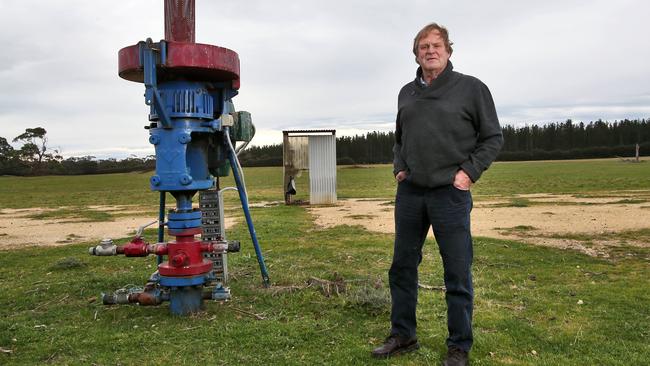Victoria’s only hope of a rapid recovery is its untapped gas reserves


But Victoria has one amazing undeveloped asset that could accelerate recovery – its immense onshore low-cost gas reserves that do not require fracking.
Although further testing was required, Exxon estimated that the massive gas deposits equalled the original reserves of the 1960s Bass Strait gas discovery which helped transform the Victorian and national economies.
It is a tragedy for both the state and the nation that the incompetent, vote-grabbing practices of both the ALP and Coalition parties have blocked the development of this nation-changing resource.
It shows just how fragile the democratic system in Australia has become.
Victoria escaped the economic consequences of its stupidity via booming education and tourism plus population increases that fanned building. Victoria’s untapped gas wealth and the enormous investment it could trigger now looks to be the state’s only hope of a rapid recovery.
But the nation has all but given up on the ability of the Victorian political quagmire to develop the gas and so plans are being made to bypass it. One plan is to ship in LNG to Westernport --- close to the undeveloped massive gas reserves. Another plan is to pipe gas from the North-West Shelf into the national grid and, finally, it looks as though NSW is going to allow Narrabri gas to be developed. But the Victorian gas is much cheaper, costing at least one third less than Narrabri.
Both Narrabri and Victorian gas are capable of sparking massive industrial development. I must emphasise that between around $30 million needs to be spent to check the Exxon conclusions and $100m to map out the field. The story of how this gas did not get developed is an Australian tragedy.
In the1940s and 1950s geologists drilled thousands of wells to plot the Victorian Latrobe Valley brown coal reserves and to look for oil. Many of the deep wells encountered water with dissolved gas but that was not their target and the discovery was ignored.
Then in the 1960s the Bass Strait oil and gas areas were pegged by BHP and they brought Exxon in as operating partner. A decade ago, when Bass Strait gas began to run down, Exxon geologists in Houston began an extensive technical review of the thousands of onshore Gippsland drill holes drilled since the early 1900s.
Jubilant, they concluded they had found what was probably Australia’s largest untapped gas reserve. Exxon was so excited by this amazing field that it agreed to spend $200 million on the areas then held by Ignite Energy Resources (via its subsidiary Gippsland Gas).
The Gippsland gas was rare in the world. It did not require fracking and was dissolved in incredibly pure water that would transform the water outlook of the dry parts of the region and protect higher rainfall parts of Gippsland from drought.
And the gas is so deep—between 500 metres and 1200 metres ---- that the water and its gas could be extracted without posing any danger to the Gippsland underground rivers called aquifers, which are used by farmers.
And the gas was only few kilometres from the Exxon distribution centre at Longford.
BlueScope pencilled an agreement to take gas for its big Western Port steel plant, so ensuring its future. The outlook for employment in the depressed Latrobe Valley would be transformed.
But in 2013 the then Victorian Coalition premier Denis Napthine had an election due the following year, and he was behind in the polls. The Greens were giving him a hard time and Gippsland was a long way from his hometown of Warrnambool, so he banned Gippsland gas exploration and development.
Whether he knew about the looming gas shortages in Bass Strait and the much higher gas and power costs Victorians and Australians would face partly as a result of his action is not known. He lost the 2014 state election. Four years later another election was looming so in February 2017 ALP Premier Daniel Andrews (without opposition from Coalition leader Matthew Guy) extended the ban until 2020 in the full knowledge that Bass Strait was running down and he was sentencing Victoria (and eastern Australia) to crippling gas prices.
Andrews had a different agenda. He was investing heavily in wind and solar power stations which was reducing the viability of brown coal by forcing maintenance reductions and making the power stations unstable.
The low cost gas would have triggered large investment in the Latrobe Valley helped by gas-driven power stations to provide back up to wind and solar. But because gas involved carbon it would slash green votes. The farmers worried about the drilling and did not want the revenue that was headed their way. And it “always rains” in most parts of Gippsland, so the water was not valued. (Later they were ravaged by a severe drought the consequences of which the gas/water fields would have avoided) And in the Latrobe Valley itself the dole had become a way of life.
The fact that Victorians and Australians were paying through the nose for gas was irrelevant---all that counted was votes and political correctness. But politicians still need to fabricate evidence that “confirms” that they were right. And so, Daniel Andrews allocated $42m to a friendly committee to determine whether there was onshore gas in Victoria. The committee dutifully found that it was highly unlikely that there was onshore gas.
But, incredibly, the high-cost committee deliberately did not look at the vast reserves of lignite gas that don’t require fracking because their development was banned. Nor did it examine the reserves of Lakes Oil in Gippsland and gas in the Otways near the South Australian border.
Victorians did not know at the time, but they were witnessing a dangerous decision-making culture emerging which US billionaire Carl Icahn had isolated as “the anti-Darwinian theory of management” or alternatively, “survival of the unfittest”.
That same management culture this year caused applicants for the job of security guards at the quarantine hotels to be trained in diversity and human rights not infection control. The consequences were even worse that the gas fiasco.
Meanwhile both Exxon and BHP want to sell what’s left of their Bass Strait oil and gas fields. The worth of those fields depends on someone spending about $30m to test the original Exxon findings.




On the surface, Victoria, Australia’s second largest state by population, faces a long haul recovery because its overseas student and tourism growth engines will not be restored quickly.